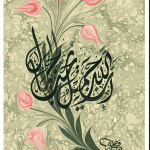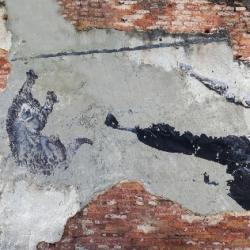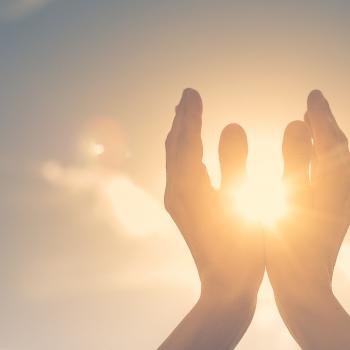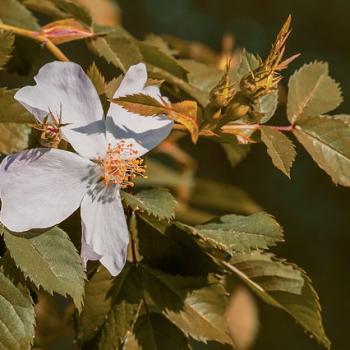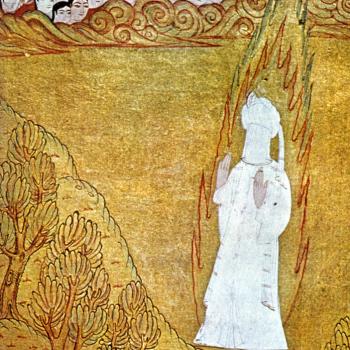More than previous Ramadans, this year the holy month felt like a journey with my Rabb, my inmost self, deeper into the arms of Mercy. Under the gentle guidance of the Sustainer who is closer to me than the beating of my heart, I traveled through time to wounded parts of myself and allowed this body to experience the tragedy of unexpressed pain and emotion.
Grief that had been tucked away, sometimes for decades, came into conscious awareness and flowed in rivers of tears through my eyes and in piercing moans resonating through my vocal cords. I allowed untended parts of me to feel the softness and tenderness of touch, of being held, nurtured, fed and, most of all, loved just as they are. Together with the compassionate attention of my Rabb, I witnessed feelings of pain, neglect and abuse and gave them permission to be expressed and seen.
I feel drawn to share one of these experiences to illustrate how I came during the month of Ramadan to more deeply understand the Quranic words in Surah Al-Araf (The Faculty of Discernment) about the Mercy of Allah overspreading everything (Quran 7.156), wrath included.
During one of the final nights in Ramadan, my Rabb took me on a journey to a memory of when I was no more than three or four. It was the middle of the night and this little me was standing in front of the window in the living room, sobbing uncontrollably. Her pyjamas were wet, as was the floor beneath her. She had peed on herself because she was too scared to go into the bathroom alone. She was convinced there was a monster lurking outside the bathroom window. Her parents had tried to reassure her it was just a tree. By day, even to her it appeared as a tree. But inevitably it was a monster again by nightfall. On the night etched in my memory, she awoke to find no one at home to take her to the bathroom. Mom and dad had rushed her sick older sister to the hospital. She was alone with the monster, and terrified.
For years, I’d seen this little girl in my mind’s eye with an expression of horror on her face as though she was separate from me. On this Ramadan night, though, the magnitude of her agony passed through this body. I felt her unmet needs viscerally. And as the feelings unfolded, the realization sunk in of how a series of traumas like this one in my childhood had influenced the perception that I wasn’t worthy of being nurtured and cared for. This core belief manifested in my life in many destructive ways.
Then, in the midst of the tears and grief that gripped my body from all these simultaneous realizations, an image appeared in my mind’s eye. Little Daliah was still there on the living room floor, only now a light emanated from her breast and filled the entire room. I understood this to be the light of the Prophet Muhammad, peace and blessings be upon him. This light lifted her off the floor and into the arms of Love. She felt fed, loved, nurtured and seen by this Love. The memory dissolved into Unending Beauty; another crevice of my psyche cleared out and transported from darkness into Light. As the room that carried such torment became radiant and empty, a deeper understanding settled into my being of why the Quran refers to Muhammad as a Mercy for all the worlds (Quran 21.107).
His light then took me somewhere I wasn’t expecting: to a memory that pre-dated my birth. In my mind’s eye, I found myself traveling with this light to the Egyptian coastline, along the Suez Canal. It was the late 1950s or early 1960s. My mother was drowning in the water and she, like me, was terrified. I’d heard stories of this day from her, but here in my mind’s eye, the details were not what mattered. As we hovered above her, the light of that beloved one lifted her from the sea, whispering softly that she had nothing to fear. She was held in the eternal arms of Love, it said. An inherited sense of feeling inundated and drowned by events in life, a sensation that I’d unconsciously carried in my bones, perceptibly loosened its grip on my body.
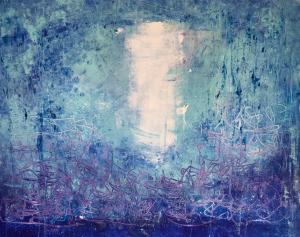

Throughout Ramadan, this journeying continued in different ways, to different wounds—some were traumas from my childhood or adult years, others were deeply painful ancestral ones passed on through the feminine bloodline that are harder to articulate. Every time, I experienced a combination of grief and grace dancing together in each wounded place. Every time, the Quranic promise, with every difficulty comes ease (94.5–6), came alive within my skin at the same moment. The marriage of these two opposing sensations worked like alchemy, leaving my mind a little emptier of compulsive thoughts and my vision clearer to see Reality. I was a little less anxious than I was before. A little more embodied. And most importantly, more able to bow, moment by moment, to my Rabb.
I realized more fully in an experiential way how our Rabb is our very own personal Educator guiding our hearts with individually designed curricula leading to spiritual maturity. When I take the hand of this gentle teacher who has always resided in my innermost heart, She guides me to the highest truth of my humanness. Always step by step, little by little, as one of my beloved teachers gently reminds us.
I feel myself being pulled toward the truth that Allah is a dimension we all have access to through our hearts; a Cosmic Intelligence longing to be known, longing to flow into the world through us, when our small, limited selves step out of the way. Not because they are forced to out of criticism, judgement or denial—that’s what leads to spiritual bypassing. But because they are loved enough to naturally bring down the defenses they’d understandably erected out of fear. And in doing so, merge into the Light their protective shields had been blocking.
Muhammad was so empty of his nafs, or ego, that he embodied this knowing completely, as evidenced in intimate prayers to his Rabb described in this piece by Mahmoud Mostafa, including this supplication:
“O my God, for You I bow down, and in You I place my faith, and unto You I submit. To You have I bowed my hearing, my sight, my brain, my bones, and my nerves.”
As we approached the end of the month of fasting, and the night of Laylat al Qadr when the prophet first received his revelation, the clarity of Mercy’s consistent flow intensified in my heart. I’d grown exhausted and weary from all the emotional processing. While lying awake in my bed in the early morning, I had a vision of being shown the depths of the pain yet to be processed. It felt bottomless and overwhelming. I sensed I could be swallowed by the grief if I were to fall in and bear it all at once.
At that very moment, a wave of tranquility washed over me. It was as though I was transported from the pit of the fire into the garden, to use Quranic language. The experience evoked a sense of bathing in a shallow stream, the sun on my face, the sound of the water gliding over the rocks in my ears and a cool breeze tickling my skin. I was aware of being enveloped in Mercy, inside and out.
I felt viscerally that my Rabb was showing me a deeper meaning of the Quranic idea that Mercy surpasses wrath. There is no ebb to Mercy. It flows and inundates us all the time, although we aren’t always paying attention. There’s the Mercy of the grief that lifts veils blocking my consciousness, guiding me ever nearer to my Rabb. There’s the Mercy of the veils that remain that protect me from bearing more than I can handle (Quran 2.286).
The magnitude of this limitless Mercy is something my small, limited self cannot comprehend. But what I have grasped and savoured through my spiritual senses is sweeter than any of the false and conditioned beliefs constructed by my nafs to artificially protect me. Just knowing this somehow makes it easier to overcome the fear of leaping into the unknown, surrendering to the pull of Mercy.
Mevlana’s poetry is rich in descriptions of the all-encompassing Mercy of the Beloved. Here, though, it feels appropriate to give the parting word to Yunus Emre, the 13th century Turkish shepherd whose mystical poetry and folk music is a balm that softens hardened hearts to this day. The lyrics of this particular ilahi, Ashkin Aldi (The Ways of Love), are ones I love to sing, and its melody is one I enjoy to play on my ney. They embody for me how, as we traverse the path of Love hand in hand with our Rabb, with ever greater honesty and sincerity, Merciful Love ultimately does overspread everything:
The more I learn the ways of Love,
the more this anxious self dissolves.
Wherever I look, you’re all I see.
It’s you within, it’s you I need.Your hands have taken me from myself,
your voice has sung within my soul.
Your melody has filled this reed.
It’s you within, it’s you I need.Our lives are shaped by loving hands,
yet we attach our own demands.
In these two worlds I’m incomplete.
It’s you I love, it’s you I need.(Lyrics after Yunus Emre, Threshold Society)
Work Cited
Helminski, Camille Adams. The Light of Dawn: Daily Readings from the Holy Qurʼān. Shambhala, 2000.


